Biden To Nominate Career Diplomat As Saudi Envoy Amid Tense Ties
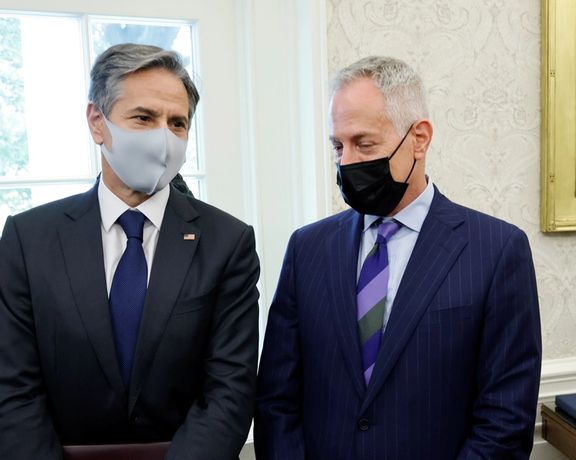
President Joe Biden intends to nominate career diplomat Michael Ratney as US ambassador to Saudi Arabia, amid strained relations between Washington and its traditional Gulf allies.

President Joe Biden intends to nominate career diplomat Michael Ratney as US ambassador to Saudi Arabia, amid strained relations between Washington and its traditional Gulf allies.
If confirmed by the Senate, Ratney, who was previously the charge d'affaires at the US Embassy in Jerusalem and the US special envoy for Syria, would be the first career diplomat to serve as ambassador to Riyadh in three decades.
US-Saudi ties have been strained by Biden's decisions last year to curtail US support for the Saudi-led military campaign in Yemen and to publish intelligence that the kingdom's de facto ruler, Crown Prince Mohammed bin Salman, approved an operation to capture or kill murdered journalist Jamal Khashoggi in 2018.
The Saudi government has denied any involvement by the crown prince, who is known as MBS, in the murder of Khashoggi.
Relations between the United States and the world's largest oil exporter have also been frayed by Biden's efforts to revive the 2015 Iran nuclear deal, which US allies in the Persian Gulf argue does too little to prevent Tehran from getting an atomic bomb.
Washington has also been trying, so far without success, to persuade Saudi Arabia to pump more oil beyond the small increase it has agreed within the OPEC+ production group to offset potential losses in Russian supplies after Moscow was sanctioned by the West over its invasion of Ukraine.
Ratney, whose official biography says he speaks Arabic and French, has previously been deputy chief of mission at the US Embassy in Doha.
Report by Reuters
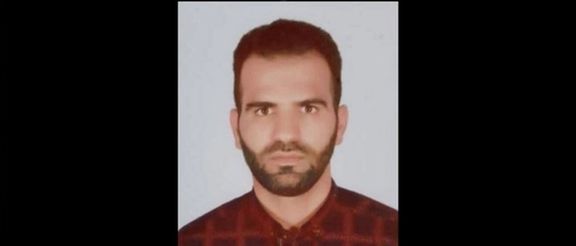
Gunmen opened fire on a car carrying a senior Revolutionary Guard commander in Iran’s restive southeastern region early on Saturday, killing a bodyguard, Iranian state media reported.
Brigadier General Hossein Almassi, the commander of IRGC’ Brigade 100 in Sistan-Baluchistan province, was unhurt after the attack and the attackers were arrested according to authorities.
However, the Baluch Activists’ Campaign, a dissident group, claimed Almassi was wounded and taken to Zahedan’s Nabi Akram hospital. The group said his condition is critical.
Mahmoud Absalan, the bodyguard who was killed in the attack that occurred near a checkpoint near the provincial capital Zahedan, was the son of Almassi’s deputy. The attackers fired from a vehicle.
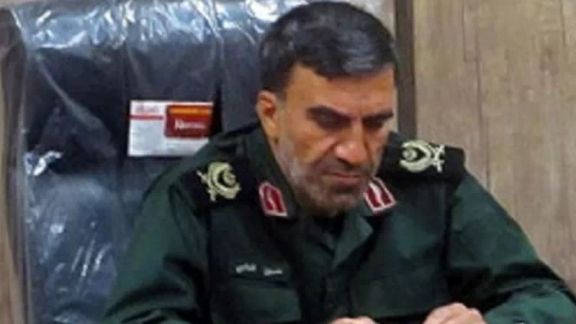
Brigade 110 known as the Salman Farsi brigade during the Iran-Iraq war in 1980s was under the command of Qasem Soleimani, who later headed IRGC’s notorious Qods (Quds) Force and was killed in a targeted US air strike in Baghdad in January 2020.
The attack came on a night celebrated by many Shiite Iranians as the holiest, which this year coincided with events marking the anniversary of the Revolutionary Guards' establishment after the 1979 Islamic revolution.
The predominantly Sunni Muslim Sistan-Baluchistan province near the Pakistani and Afghan borders has long been plagued by unrest from both drug smuggling gangs and Sunni Islamist militants fighting the country's Shi’ite authorities.
Many of Iran's Sunnis complain of discrimination, a charge denied by the state.
In 2009, a suicide bomber killed six senior Revolutionary Guards commanders and more than 29 other people in Sistan-Baluchistan, in one of the boldest attacks on Iran's most powerful military institution.
With reporting by Reuters

Senior Republican Senator Marco Rubio has called for the release of Iranian dual citizen Emad Sharghi on his fourth year in an Iranian prison.
Rubio said in a tweet on Friday it’s four years that Sharghi remains unjustly detained in the notorious Evin Prison under false charges.
Senator Rubio called for the immediate release and safe reunification of the American-Iranian with his family, said his tweet.
In January 2021, Iran’s Young Journalists’ Club (YJC), which is affiliated with the state broadcaster, reported that the 56-year-old businessman was arrested on December 6.The report said he had been sentenced to ten years in prison on charges of espionage and collecting military intelligence but had attempted to flee while on bail awaiting the result of an appeal.
According to Iranian media, Sharghi served as the international deputy head of Sarava, a major Iranian holding company, but following the announcement of his arrest, Sarava said that Sharghi’s involvement had ended in May 2018.
Allegations that dual nationals are taken prisoner to swap them with Iranian prisoners held abroad, often serving sentences for violating US sanctions or on ‘terrorism’ charges, have been made in several cases of dual nationals detained in Iran.
Earlier in the week, families of two German and two Austrian citizens currently jailed in Iran called on the governments in Berlin and Vienna to demand their release as part of nuclear talks with Tehran.
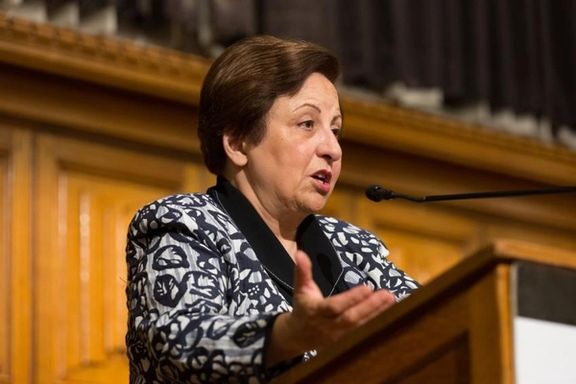
Iranian Nobel Peace Prize Laureate Shirin Ebadi has called for the postponement of a visit by a UN official to assess impact of sanctions until Iran lets in the UN Special Rapporteur on Human Rights.
In a letter to United Nations High Commissioner for Human Rights Michelle Bachelet published on Friday, she said that while the human rights situation in Iran has been deteriorating, the Islamic Republic refuses to allow a visit by UN Special Rapporteurs on Human Rights in Iran for years.
Ebadi added that Iran doesn’t allow transparency about its human rights situation but has welcomed a visit by the UN Special Rapporteur on the negative impact of the unilateral sanctions on human rights, Alena Douhan.
The trip was planned at the request of the Islamic Republic because it wants to prove that increasing poverty in Iran is the result of sanctions, while “the systematic corruption in Iran and large-scale embezzlements, as well as the wrong policies of the government over the past forty years cannot be overlooked”, she noted.
Ebadi urged Bachelet to use all her legal means to postpone the visit until Iran also allows its human rights rapporteur Javaid Rehman to enter the country, saying that both can travel to Iran together so that they provide “a complete view” of the situation for international authorities.
Douhan is scheduled to visit Iran to assess the impact of unilateral sanctions on human rights from May 7 to 18 and is set to submit her conclusions to the 51st Session of the Human Rights Council in September 2022.
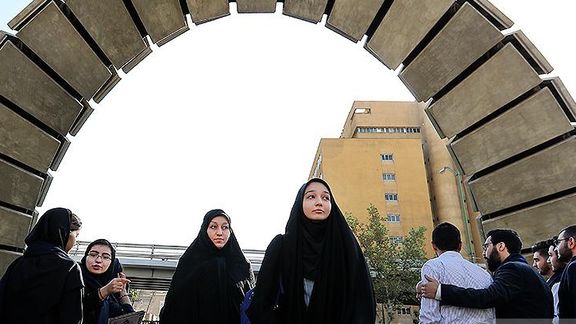
In an unprecedented move, morality guards began patrolling campuses of Iranian universities to force students comply with hijab and other Islamic regulations.
Ensaf News, a reformist website, on Friday reported that students of Amirkabir University in Tehran, one of the largest and most prestigious universities in the country, have said that morality guard patrols have also been issuing warnings to male and female students who talk to each other and confiscated their student cards or written down their details, presumably to keep a record of their "infringements".
Other guards who are stationed at the gates of the university and its dormitories have also been unprecedently strict since universities opened recently after a two-year hiatus due to the pandemic, students say, denying access to those whose appearance is not deemed "appropriate".
"Everybody gets scared of getting into trouble when there is a sound of motorbikes," one of the students at Amirkabir University told Ensaf. She said she had been told off by one of the guards who took her student card number for the record because the front of her short hair showed from under her headscarf. "It was never like this at this university before the pandemic," she said.
According to Ensaf News, students say after the re-opening of higher education institutions this year, the atmosphere has greatly changed. Authorities appointed after hardline President Ebrahim Raisi was elected, they say, are apparently finding it a good time to enforce an aggressive approach to Islamic discipline on students.
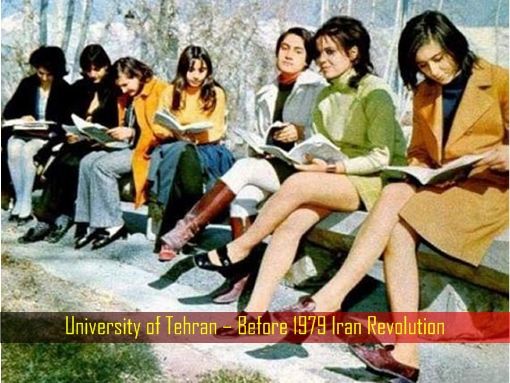
According to Ensaf News, the morality guards have in some cases forced girls to return to their dormitories and change into more "modest" coats. The new strict measures to which they are not accustomed, students say, have affected their attendance in classes because even one's color of socks can get them into trouble.
Students use social media to share experiences. They write that in some universities, including Tehran University, they are now required to wear at least veils similar to nuns instead of ordinary headscarves to cover their shoulders and that they are prevented from entering if they don't.
Since hijab became compulsory in Iran, within a couple of years from the Islamic Revolution of 1979, all government offices and universities have had special officers monitoring women's abidance by the rules of compulsory hijab and preventing those failing to meet their standards of modesty from entering the premises.
Men whose clothing looked "too western", too tight, or those who wore short-sleeve shirts would also be turned away at the gates.
In larger cities most universities in the past two decades only required women to wear regular headscarves and long coats in black or other modest colors such as brown, beige or gray, and trousers coming down to ankles but not the long black veil (chador) that completely covers the body from head to toe.
Universities in some smaller, more conservative towns, however, have always required girls to wear the veil. Many students, particularly those from large cities studying in smaller towns, would bring the veil with them to campus and only wear it when they were close to the gate.
Authorities have always promoted the long black veil as "the optimum (or best) type of hijab" but only a fraction of Iranian women wear it on a regular basis.
In some universities even the Islamic Student Unions have protested to the new strict measures. "Universities are not military barracks and dormitories are not prisons," the Islamic Union of Science and Technology University in Tehran said in a statement on Wednesday.

The Taliban said Wednesday they had arrested a man trying to sell an advanced United States military reconnaissance balloon to Iran.
The Interior Ministry in Kabul announced the man, named only as ‘Mostafa,’ and his still-at-large accomplice ‘Alireza’ were negotiating over a price well short of the balloon’s cost. The ministry said Mostafa was from the central province of Uruzgan.
The balloon is a tethered aerial detection system known as the Joint Land Attack Cruise Missile Defense Elevated Netted Sensor System (JLENS) and is used to detect missiles, drones, piloted aircraft, boats, and ground vehicles. JLENS has surveillance radar scans in all directions and can provide constant, 360-degree coverage extending 550km.
In the weeks before and after the US military withdrawal from Afghanistan last summer, the Taliban seized weapons and equipment left by fleeing Afghan forces. Reuters suggested last year that US intelligence assessed Afghanistan’s new rulers acquired more than 2,000 armored vehicles, including Humvees, and up to 40 aircraft potentially including UH-60 Black Hawks, scout attack helicopters, and ScanEagle military drones.
According to Reuters, between 2002 and 2017, the United States transferred to the Afghan military around $28 billion in weaponry, including rockets, night-vision goggles, and intelligence-gathering drones.